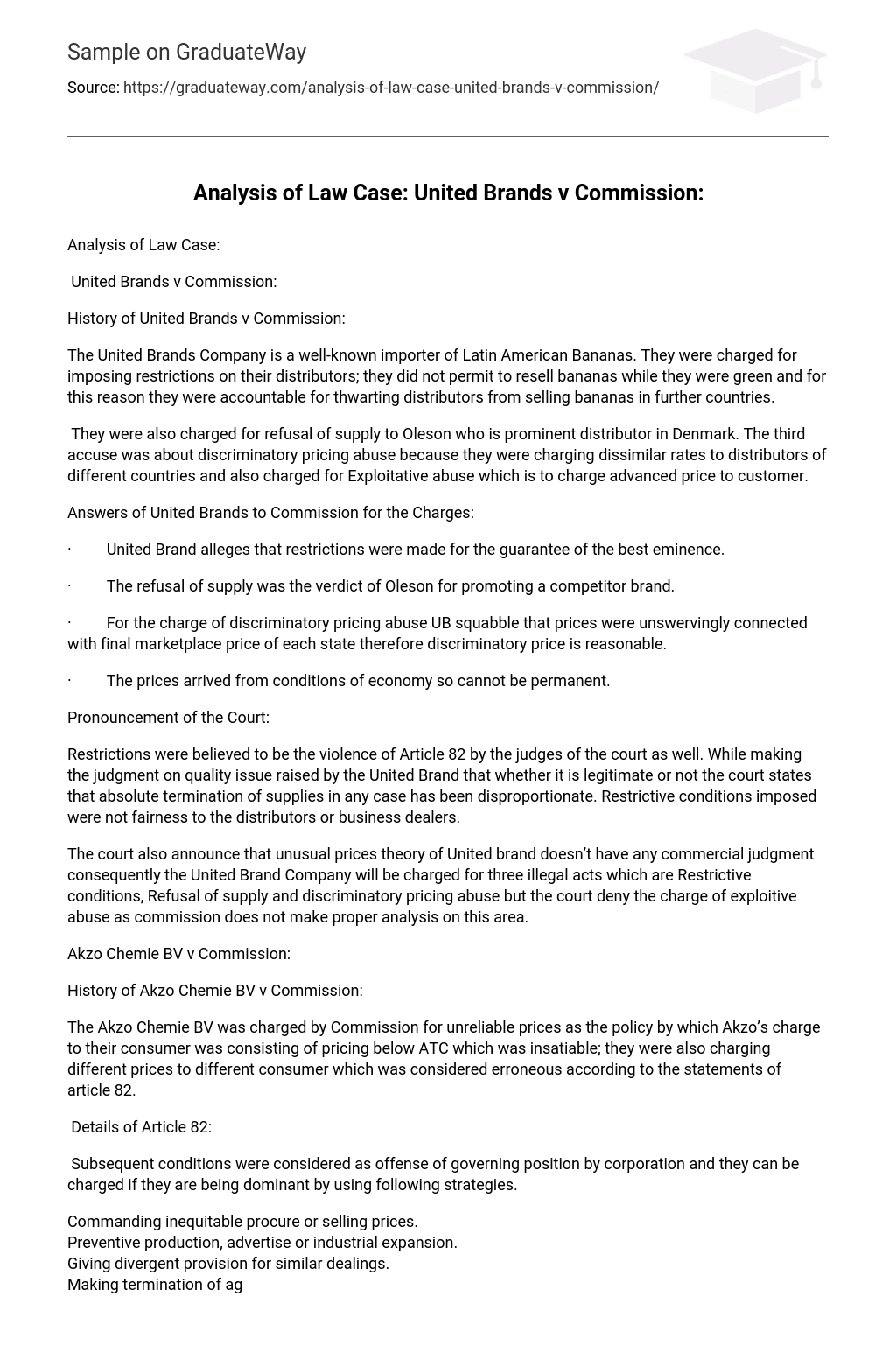Analysis of Law Case:
United Brands v Commission:
History of United Brands v Commission:
The United Brands Company is a well-known importer of Latin American Bananas. They were charged for imposing restrictions on their distributors; they did not permit to resell bananas while they were green and for this reason they were accountable for thwarting distributors from selling bananas in further countries.
They were also charged for refusal of supply to Oleson who is prominent distributor in Denmark. The third accuse was about discriminatory pricing abuse because they were charging dissimilar rates to distributors of different countries and also charged for Exploitative abuse which is to charge advanced price to customer.
Answers of United Brands to Commission for the Charges:
· United Brand alleges that restrictions were made for the guarantee of the best eminence.
· The refusal of supply was the verdict of Oleson for promoting a competitor brand.
· For the charge of discriminatory pricing abuse UB squabble that prices were unswervingly connected with final marketplace price of each state therefore discriminatory price is reasonable.
· The prices arrived from conditions of economy so cannot be permanent.
Pronouncement of the Court:
Restrictions were believed to be the violence of Article 82 by the judges of the court as well. While making the judgment on quality issue raised by the United Brand that whether it is legitimate or not the court states that absolute termination of supplies in any case has been disproportionate. Restrictive conditions imposed were not fairness to the distributors or business dealers.
The court also announce that unusual prices theory of United brand doesn’t have any commercial judgment consequently the United Brand Company will be charged for three illegal acts which are Restrictive conditions, Refusal of supply and discriminatory pricing abuse but the court deny the charge of exploitive abuse as commission does not make proper analysis on this area.
Akzo Chemie BV v Commission:
History of Akzo Chemie BV v Commission:
The Akzo Chemie BV was charged by Commission for unreliable prices as the policy by which Akzo’s charge to their consumer was consisting of pricing below ATC which was insatiable; they were also charging different prices to different consumer which was considered erroneous according to the statements of article 82.
Details of Article 82:
Subsequent conditions were considered as offense of governing position by corporation and they can be charged if they are being dominant by using following strategies.
Commanding inequitable procure or selling prices.
Preventive production, advertise or industrial expansion.
Giving divergent provision for similar dealings.
Making termination of agreement issue with approval.
Pronouncement of the court:
The court declared that the charge of unreliable prices on Akzo Chemie BV is taken as true because the commission has made the complete analysis on the pricing strategy of Akzo Chemie BV.
The court declared that commission uses two unlike techniques. In the beginning they premeditated underneath the AVC but after that the calculations were made between AVC and ATC which indicates the predation to eliminate the competitor.
The Commission investigating cost exploitation concerning dissimilar products of markets relied on the theory of LRAIC like a cost point of reference.
Therefore the Akzo Chemie BV were charged for this illegal act, the court declared that rules of article 82 must be followed by every manufacturing proprietor as they want equivalent civil rights and proceeds for all of the tradesman.
References
European court report, retrieved from http://eur-lex.europa.eu/LexUriServ/LexUriServ.do?uri=CELEX:61985J0053:EN:HTML.
Jackie Harrison, Lorna Woods, European broadcasting law and policy, September 2006, retrieved from http://www.cambridge.org/us/catalogue/catalogue.asp?isbn=9780521613309&ss=fro.
Predatory pricing, 29/3/2006, retrieved from , http://www.internationalcompetitionnetwork.org/media/library/unilateral_conduct/2007QuestionaireDocs/EUROPEAN%20COMMISSION%20RESPONSE.pdf.
United Brand v Commission retrieved from http://www.reckon.co.uk/open/United_Brands.





